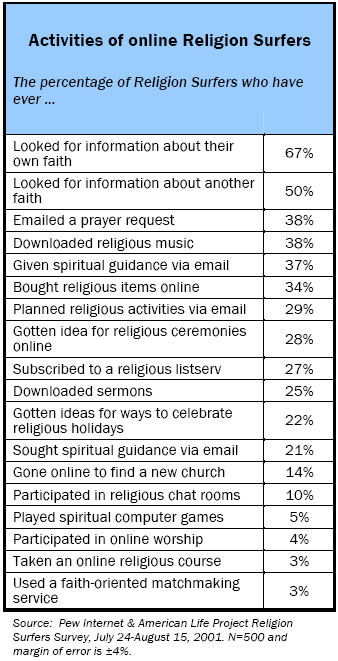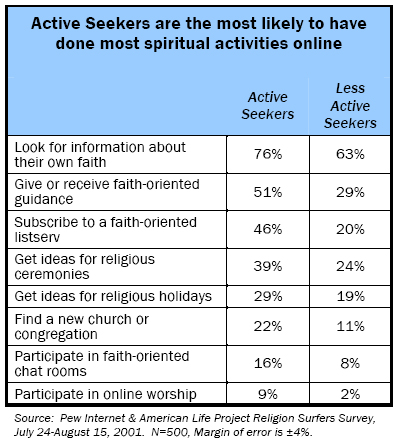Activities
Religion Surfers are a spiritually well-rounded group who incorporate into their spiritual lives communal and individual activities, formal and informal practices. The most valued spiritual activities to Religion Surfers are individual prayer (85%), volunteer service (71%), communal worship (70%), and informal conversations with friends (69%). By contrast, the importance to them of going online for religious material is relatively low, with only 13% considering it “very important” to them.

Whether or not online content and activities contribute materially to their spiritual life, however, Religion Surfers still have favorite Internet-based activities. Active Seekers in particular like to explore various online materials, and are more likely than any other group to have participated in most types of online activity or practice.
Reference and study
Religion Surfers enjoy perusing religious topics, and the Internet remains a browser’s dream. The top uses by Religion Surfers are simply to find information on their own faith or another one. Almost all non-Christians (96%) report seeking information on their own faiths. In this predominantly Christian country, the Internet may well be the most fruitful and convenient source of information on other religious traditions.
Among Religion Surfers, men are more likely than women to have used the Internet as a reference, 73% vs. 62% for researching their own faiths, and 57% to 46% for researching other faiths. Men are also twice as likely as women to have sought out sermons or other instruction online, 35% to 18%. While online religion courses would fit into this category of study, they are not yet popular. There are many plausible reasons for this, not the least of which might be that 85% of Internet users in America have slow dial-up modems that could make online coursework difficult and frustrating. It is far easier to simply browse at one’s convenience on topics of interest.
Social activities
Old-fashioned face-to-face socializing is much more appealing to Religion Surfers than tech-aided interactions with others that are related to faith. Among the five least-used activities among Religion Surfers, three are largely social: online chat, playing faith-oriented computer games,8 and using a faith-oriented matchmaking service.
In a different sense, however, the very nature of seeking religious material online appears to be a social one. Half of Religion Surfers have recommended a site to a friend or relative, and these recommendations are primary sources of favored sites. Some 44% of those who have a single favorite site learned of it from a friend or relative, rather than from their own searching. And 63% of Religion Surfers with a favorite site pass the URL along. However, while favorite sites may bounce around existing social networks, they do not serve to create new ones. Only 15% of those with favorite sites report using them to meet new people.
Advice and support
Those willing to seek advice or assistance can often find help online. Religion Surfers are quite generous. When asked about the support capabilities of the Web, they were far more likely to have reported giving faith-oriented advice (37%) than asking for it (21%). Women are more active than men in both seeking and giving advice.
Some 38% of Religion Surfers have used email to request prayer assistance. Online, one can put out prayer requests to close friends within one’s own congregation,9 to total strangers who volunteer their prayer time at Web sites, or to strangers who come together in online prayer circles to request prayers from and post them for each other. Congregation members are over three times as likely (42% vs. 12%) to have emailed prayer requests, suggesting that this intimate kind of interaction might be most practiced within existing communities.
The value of listservs
Advice manuals for creating successful Web sites stress repeatedly the need to keep content fresh and interesting. One means of providing regular fresh content is to provide a listserv. Religion Surfers can sign up for daily devotional material or updates from religious news services. Nearly one in three (27%) Religion Surfers are signed up to some sort of listserv, but it is particularly popular among Active Seekers. As stands to reason, Active Seekers are more likely than all others to have taken part in the activities we asked about, but in no other activity is the difference between Active Seekers and Religion Surfers as a whole so large. With almost half of Active Seekers subscribing to some form of religious listserv, they stretch 20 percentage points ahead of all Religion Surfers as a whole.

Spending money, tuning in
Online shopping and downloading music are two popular activities in the general Internet world. Shopping may be more of a secular activity online than a favorite pastime of Religion Surfers: 55% of all Internet users have purchased something online, whereas only 34% of Religion Surfers have clicked “head to checkout” for religious items. But music, whether sacred or worldly, enjoys equal appreciation among groups. Some 38% of both the Internet population as a whole and Religion Surfers in particular have listened to online music, and over half of young people (18-29) in both groups have done so.
Contributing money
It is hardly a revelation that Religion Surfers contribute to their places of worship. Fully 92% of them have done that. However, only a few have actually used the Internet to make contributions. Just 7% of Religion Surfers have made donations to a religious organization they found online. And only a fraction of that small group (14%) has actually made the contribution online.


